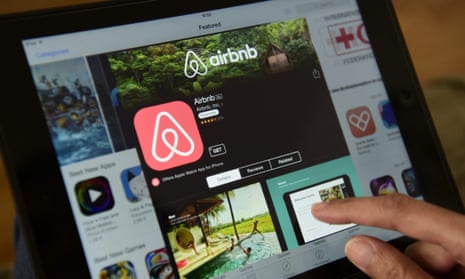So there I was, looking forward to a Saturday morning lie-in at my Airbnb when the host knocked on the door just before 9am.
“Err, I forgot to tell you, there’s an open for inspection. You’ll have to get up, clean your room and pretend you’re my cousin.”
“What?”
I peered out the window. Typical Sydney. There were hundreds of people in activewear snaked around the block to see this inner-city terrace. A woman with a clipboard stood at the front of the queue and unfolded one of those for lease signs, and the people surged in. My host disappeared down the street for a coffee, people walked up the stairs – iPhone cameras at 50 paces – and half asleep I answered questions about whether there was a second bathroom (I’m not sure), is this house always this hot (it has been hot the last two nights), and is the neighbourhood safe? (It’s all right).
Once again, Airbnb had brought a little bit of unexpected weirdness to my life.
No matter how glossy and cool the Airbnb advertising is, with all the shiny shots of people staying in Airstreams in Texas backyards or converted air-conditioned food trucks in New Orleans, staying in an Airbnb is weird because people are weird, and their lives are complicated, their routines idiosyncratic and their bookshelves are windows into their souls. Conversations are curious, and awkward silences are things to be negotiated. You cannot be on automatic pilot at an Airbnb because strange things happen in other people’s homes, on their patch, across their kitchen tables.
The night before I had to pretend be to my Airbnb host’s cousin, as part of Sydney festival I’d seen a play in a multi-storey car park. It was boiling hot – 44C – and we had to carry around these little chairs to various spots in the car park where the actors were clustered. We were also given headsets, which were worn at various times. All the time we were wondering: what would happen next? Where would the story go? What would we be made to do?
People seek out these experiences. They pay for it – the confusion of not knowing what’s next, the experience of disorientation. With Airbnb it’s all part of the service.
The weirdest Airbnb I stayed at was a Zen Buddhist temple.
“Did you read the rules on the website about your time here?” asked my host, who was not a Buddhist monk, but helped run the temple. No, I had not.
One of the rules – in addition to daily meditation starting with gonging at 5.30am, and two hours’ work around the temple – was that we were to fast from about 6pm until lunchtime the next day. If I had read the rules, I would have brought snacks.
After working in the temple, meditating and napping, at night we sat around with the monk and our host drinking good whiskey and massive cans of beer.
In addition to running the Airbnb at the temple, my host also had a mail-order business in making and distributing anti-chafing cream for the male chastity belt community. That night I learned the male chastity belt community is mainly straight, wives buy the belts for their husbands because of some past misdemeanour on a business trip, and the mesh belts hurt like hell sometimes because of chafing. Hence the need for cream.
In the mornings I sat in a hot laundry room, surrounded by large piles of pillowcases and tea towels, folding them with the monk’s mother, who was almost 100 and spent much of her day watching US sport and Korean soap operas.
Folding laundry was my temple service. I was weak from fasting, hungover from the whiskey, tired from the predawn gonging, still confused by the idea that there was a male chastity belt community for whom secondary products could be marketed – yet, yet ... this was life! This was how people lived! This was temple life! This was the strangest place I’d stayed in.
Only a few days before I’d been in Seoul, where the most personal thing about my hotel was the card programmed to open the door to my room.
You go to hotels for the absence of idiosyncrasy, for the impersonal service, for the invisible hand of turndown service and the restocking of the mini bar.
But you go into an Airbnb in part to marvel at the messiness of the lives of others.
The frosty divide between the haves and have nots
The heat! The heat! After several nights of 30C or more (at 2am!!), much of the population of eastern parts of Australia were walking around like zombies on Wednesday.
There were the nasty hot winds, the scorching beaches with no shade, the sunburn, the creams for the sunburn, the concrete apartment blocks with no aircon or design that allowed for cross breeze, and even if they did – no cross breeze!
In the office with one glance you could tell those who had air-conditioning and those who did not. Those of us who lived by the fan had the haunted look of new parents of a colicky baby. We experienced what it was like to feel as if our organs were cooking from within. The air-conditioned people looked rested and relaxed. It’s the new class divide.

